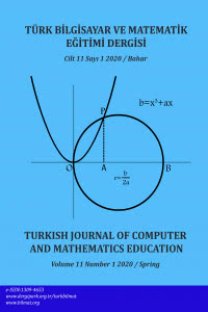Çevrimiçi Uzaktan Eğitim Ortamında Topluluk Hissi Ölçeği Geliştirme Çalışması
Bu çalıımanın amacı, karma öğrenme modeli üzerine yapılandırılmış bir uzaktan eğitim programına kayıtlı öğrencilerin çevrimiçi ortamdaki topluluk hissi geliştirme durumlarını incelenmek için bir topluluk hissi ölçeği geliştirmektir. Bilgi iletişim teknolojilerinin uzaktan eğitimdeki rolünün artmasıyla etkileşimlerin bu araçlar aracılığıyla yapılması önem kazanmıştır. Bu durumun olumlu katkılarının yanı sıra sosyal izolasyon, dikkat dağınıklığı, dikkat azalması gibi öğrencinin motivasyonunu, başarısını, memnuniyetini ya da öğrenmesini azaltıcı etkileri de olabilmektedir. Uzaktan eğitimin kalite göstergelerinden biri olan terk oranlarında topluluk hissinin rolü büyüktür. Bu amaçla Rovai, Wighting ve Lucking‟in 2004 yılında geliştirdikleri ölçekten yola çıkılarak bir ölçme aracı geliştirilmiş ve geçerlik-güvenirlik çalışmaları yapılmıştır. Hazırlanan ölçek Ankara Üniversitesi İlahiyat Lisans Tamamlama Uzaktan Eğitim Programı birinci sınıf öğrencilerinin 571‟inden elde edilen verilerle geliştirilmiştir. Yapılan analizler sonucunda ölçek 6 madde ve 2 faktörlü olarak son halini almıştır. Sonuç olarak uzaktan eğitimde çevrimiçi ortamlarda eğitim gören öğrencilerin topluluk hislerini belirlemek amacıyla kullanılmak üzere geçerlik ve güvenirlik çalışmaları yapılmış bir ölçek geliştirilmiştir.Anahtar Kelimeler: Topluluk hissi ölçeği, çevrimiçi öğrenme, doğrulayıcı faktör analizi
Anahtar Kelimeler:
-
The Development of a Community Feeling Scale toward Online Distance Education Environments
The aim of this study is to develop a community feeling scale in order to analyze the community feeling of learners, enrolled in a distance education program which is designed with blended learning model, in online environments. Providing interaction with information communication technologies come into prominence as a result of increasing importance of these technologies in distance education. Although this situation has positive contributions, it may have negative effects on decrement of the motivation, achievement, satisfaction or learning of student such as social isolation, aprosexia, and feeling of alienation. The role of community feeling is major on drop out rates, which is one of the quality indicators of distance education. Rovai (2001b) defined classroom community components, including McMillan and Chavis‟s four components of community dimensions. These components are spirit, trust, influence and learning. Spirit shows the acceptance of the membership in the community and develops the feelings of friendship, commitment and satisfaction between the students. Trust is the second one of the class community components. It will be friendly and constructive if the community can be trusted and be given feedback by individuals. When individuals have been accepted by a growing and developing community, they feel more in safe and start to trust to community. The third component, influence is the feeling of closeness and mutual benefit between the individuals. The last component learning is the feeling that community enhances the acquisition of knowledge and understanding, and also the feeling of active information and meaning conformation which supplies the educational needs of the individuals that it consists of. According to the research results, the community feeling of students has so many positive effects. Strong community feeling have positive outcomes as increasing the flow of information, access to support, collaboration between the members and satisfaction about the group activities (Rovai, 2000). By increasing the numbers and qualities of interactions in distance education programs, the community feeling in online mediums can be improved.By this aim the scale, which was based on Rovai, Wighting and Lucking's (2004) study, validity and reliability analyzes has been executed. The scale has been developed by the data which were obtained from 571 of the freshmen of the Ankara University Distance Education Program of Completion of Undergraduate in Faculty of Theology in 2007-2008 terms. At the end of the analysis the scale has been finalized with 6 items under 2 factors. As a result, in order to determine the community feeling of the learners who were registered to online distance education environments, a scale has been developed with validity and reliability studies. It is founded that keeping interaction between students by various tools such as discussion boards, chat modules or e-mails is important about prevention of students from social isolation, not being a member of the group in online distance education environments. The students who are being in interaction with each others will be more willing to participate in learning activities and won‟t tend to drop out as a result of feeling of alienation. This situation will affect students‟ achievement and satisfaction in a positive way.
Keywords:
-,
- Başlangıç: 2009
- Yayıncı: Türkbilmat Eğitim Hizmetleri
Sayıdaki Diğer Makaleler
Öğrenme Nesnelerine Dayalı Bir Öğrenme Ortamının Farklı Açılardan Değerlendirilmesi
Ünal Çakıroğlu, Adnan Baki, Yaşar Akkan
VQ Yöntemiyle KonuĢmacı Cinsiyetinin Belirlenmesi
Uzaktan Eğitimde Öğretim Yönetim Sistemi ve Senkron Eğitim Platformu Tasarim Süreci: KTÜ Örneği
Adnan Baki, Hasan Karal, Ayça Çebi, Lokman Şılbır, Memnune PEKŞEN
Adnan Baki, Hatice Yalçınkaya, İlknur Özpınar, Selcen Uzun
Çevrimiçi Uzaktan Eğitim Ortamında Topluluk Hissi Ölçeği Geliştirme Çalışması
